

Facts & FAQ. The International Society for Sexual Medicine (ISSM, formerly known as ISIR/ISSIR) was established in 1978 for the purpose of promoting research and exchange of knowledge for the clinical entity "impotence" throughout the international scientific community.
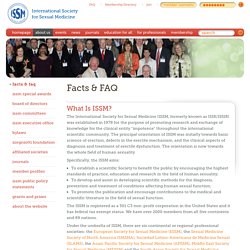
The principal orientation of ISSM was initially towards basic science of erection, defects in the erectile mechanism, and the clinical aspects of diagnosis and treatment of erectile dysfunction. The orientation is now towards the whole field of human sexuality Specifically, the ISSM aims: To establish a scientific Society to benefit the public by encouraging the highest standards of practice, education and research in the field of human sexuality; To develop and assist in developing scientific methods for the diagnosis, prevention and treatment of conditions affecting human sexual function; To promote the publication and encourage contributions to the medical and scientific literature in the field of sexual function.
Human Self. Keeping_track_your_medicines.pdf. National Institute on Aging. NIHSeniorHealth Home Page. Respite Locator Service. Additional Resources Consumer Information: Before searching for respite, please read this consumer's guide, The ABCs of Respite, for assistance in choosing a respite care provider and for additional funding and support information.
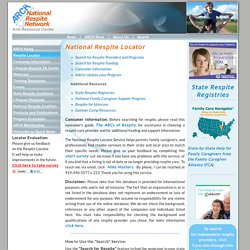
The National Respite Locator Service helps parents, family caregivers, and professionals find respite services in their state and local area to match their specific needs. Please give us your feedback by completing this short survey. Let me know if you have any problems with this service, or if you find that a listing is out of date or no longer providing respite care. To reach me via email, click Mike Mathers.This e-mail address is being protected from spambots. Disclaimer: Please note that this database is provided for informational purposes only and is not all-inclusive. How to Use the "Search" Service: Use the "Search for Respite" feature to find the programs in your state and city that provide the services you are requesting.
Summer Camp Resources. Advance Care Planning. Advance care planning is not just about old age.
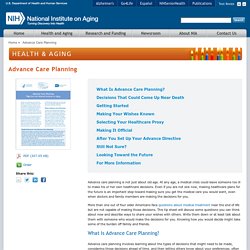
At any age, a medical crisis could leave someone too ill to make his or her own healthcare decisions. Even if you are not sick now, making healthcare plans for the future is an important step toward making sure you get the medical care you would want, even when doctors and family members are making the decisions for you. More than one out of four older Americans face questions about medical treatment near the end of life but are not capable of making those decisions. This tip sheet will discuss some questions you can think about now and describe ways to share your wishes with others.
Write them down or at least talk about them with someone who would make the decisions for you. What Is Advance Care Planning? Medication-glossary.pdf. Lewy Body Dementia Association. Lewy Body Dementia: Information for Patients, Families, and Professionals. Federal Government National Institute on Aging Alzheimer’s Disease Education and Referral (ADEAR) Center P.O Box 8250 Silver Spring, MD 20907-8250 1-800-438-4380 (toll-free) www.nia.nih.gov/alzheimers National Institute of Neurological Disorders and Stroke P.O.
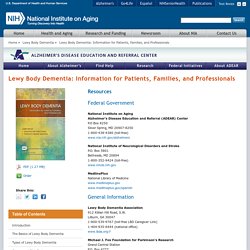
Box 5801 Bethesda, MD 20894 1-800-352-9424 (toll-free) www.ninds.nih.gov MedlinePlus National Library of Medicine www.medlineplus.gov www.medlineplus.gov/spanish. Cognitive Impairment in Heart Failure. Dietitians_bestpracticeguideline.pdf. On the Pharm. Nootropic. Nootropics (/noʊ.əˈtrɒpɨks/ noh-ə-TROP-iks), also referred to as smart drugs, memory enhancers, neuro enhancers, cognitive enhancers, and intelligence enhancers, are drugs, supplements, nutraceuticals, and functional foods that improve one or more aspects of mental function, such as working memory, motivation, and attention.[1][2] The word nootropic was coined in 1972 by the Romanian Dr.
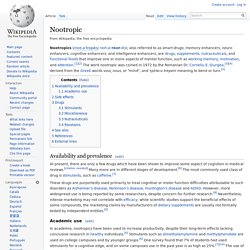
Corneliu E. Giurgea,[3][4] derived from the Greek words νους nous, or "mind", and τρέπειν trepein meaning to bend or turn.[5] Availability and prevalence[edit] At present, there are only a few drugs which have been shown to improve some aspect of cognition in medical reviews. [citation needed] Many more are in different stages of development.[6] The most commonly used class of drug is stimulants, such as caffeine.[7] Academic use[edit] Surveys suggest that 3–11% of American students and 0.7–4.5% of German students have used cognitive enhancers in their lifetime.[11][12][13] Side effects[edit] Drugs[edit] Bionica. Memory. Body Worx. Midwivery. Integrative Medicine. Shaman Guides. Family Matters. All Together Now. Go Team! Genomics. Age Exchange - Internationally Renowned for Work in all Areas of Reminiscence.
Narrative-Based Medicine: Potential, Pitfalls, and Practice. Pillbox - prototype pill identification system. Attunement. Left Hand of Darkness. HOMEOPATHY. LEARNING. New Old School. New Learning. Songs in the Key of Life. Études. Language Learning. Games Storyfy. Games Educate. New Gaming.